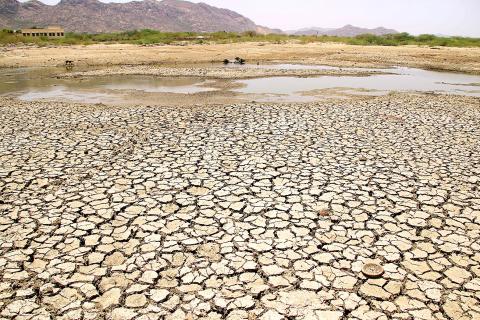Temperatures in an Indian desert city hit 50 degrees Celsius on Monday last week for the second time in three days as a deadly heat wave maintained its grip on the country.
The thermometer hit 50.3 in Churu in Rajasthan state, sending residents scrambling for shade to escape the searing sun.
On Saturday it reached 50.6 degrees Celsius, close to the country’s record of 51 degrees Celsius recorded in the Rajasthan city of Phalodi in May 2016.

Photo: AFP
照片:法新社
Cities across northern India have been sweltering with temperatures above 47 Celsius.
A farmer died in Sikar district of Rajasthan on Sunday after suffering heatstroke. Other deaths have been reported.
The Indian Meteorological Department said the severe heat wave was likely to continue in Rajasthan and Madhya Pradesh states.
New Delhi and neighboring Uttar Pradesh state would also be affected by extreme weather, it said.
Temperatures fell to about 40 degrees Celsius in Delhi on Monday last week, but residents still complained of heat exhaustion.
“It’s really hot right now but what can we do? We still need to keep our business going. We need to be able to feed ourselves, so we have to stay open,” said market trader Laxmi Jagdish.
The annual monsoon — which normally brings much-needed rain to South Asia — was behind schedule.
Private forecaster Skymet has warned there will be less rain than average this year.
The Indian peninsula has seen a drastic change in rainfall patterns over the past decade, marked by frequent droughts, floods and sudden storms.
According to weather monitoring Web site El Dorado, out of the 15 hottest places in the world last week, 11 were in India and four in neighboring Pakistan.
(AFP)
上週一,印度沙漠城市的氣溫達到攝氏五十度,這是三天來的第二次,因為致命的熱浪一直籠罩著印度。
在拉賈斯坦邦的城鎮丘魯,溫度計指標衝上五十點三度,居民爭相尋找庇蔭,以躲避灼熱的太陽。
上週六溫度還飆到攝氏五十點六度,接近二○一六年五月在拉賈斯坦邦的帕洛迪所創下的五十一度記錄。
印度北部的城市一直酷熱難當,氣溫超過攝氏四十七度。
上週日在拉賈斯坦邦的錫卡爾地區,有位農民在中暑後死亡。據報還有其他死亡案例。
印度氣象局表示,拉賈斯坦邦和中央邦可能還會有嚴重的熱浪。
印度氣象局指出,新德里和鄰近的北方邦也會受到這極端天氣的影響。
德里的氣溫週一降到約攝氏四十度,但居民仍受熱衰竭之苦。
「現在真的很熱,但我們能怎麼辦呢?我們還是得開店。我們還是得討生活,所以必須開店營業」,市場商販拉斯米‧札迪許表示。
一年一度的季風──季風通常會給南亞帶來亟需的雨水──仍遲遲未來。
非官方的氣象預報公司Skymet警告說,今年的降雨量將會低於平均值。
在過去十年中,印度半島的降雨形態發生了巨大的變化,經常發生乾旱、洪水和突如其來的暴風雨。
天氣監測網站El Dorado的數據顯示,在過去一週內,世界上最熱的十五個地方中,有十一個在印度,四個在印度鄰國巴基斯坦。
(台北時報林俐凱譯)

詞法—不定詞的誤用 1. 我得記住星期五要把報告寫好。 ˇ I must remember to finish my report by Friday. χ I must remember finishing my report by Friday. 註︰remember 後面跟動名詞或不定詞表示兩種不同的概念,與 forget 相類似。 試比較下列句子: I remember meeting him somewhere.(我記得曾經在某處見過他。) I must remember to meet him at the station at six this evening. (我必須記住今晚六點得去車站接他。) He remembered turning off the light when he left the room. (他記得離開房間時曾先把燈熄了。) Remember to turn off the light when you leave the room. (記住離開房間時要把燈關了。) 2. 他提醒她做好她份內的事。 ˇ He reminded her to do her job. χ He reminded her of doing her job. 註︰remind ... of ... 後面跟動名詞,表示「使人想起做過某事」。若是「提醒某人應做某事」,應用 remind ... to do ...。試比較下列句子: He reminded me of my attending the lecture last Friday. (他讓我想起我上星期五去聽過那次演講。) He

★ Bilingual Story is a fictionalized account. 雙語故事部分內容純屬虛構。 “Any New Year’s resolutions?” he asked. Lena put her coffee down. “Yeah,” she said. “To get in shape.... round is a shape, right?” Mark chuckled. “I support this. Fully achievable. Low risk.” “Thanks,” she smiled and lovingly rubbed her round belly. “I like a resolution I can’t fail.” “Funny thing is, I was thinking about getting round too.” Lena nodded her head in approval, “You could put some meat on those skinny bones of yours.” Mark shook his head, “Not that kind of round. Wheel-of-Life round.” She raised an eyebrow.

A: Apart from Taiwan’s A-mei, Mayday and Jolin Tsai, there are many foreign singers coming to Taiwan early this year. B: The South Korean girl group Babymonster are playing two shows at Taipei Arena starting from tonight. Who else is coming to Taiwan? A: Other artists include Australian band Air Supply, K-pop superstar Rain, boy group Super Junior, TXT, US singers Giveon and Josh Groban, and Irish boy group Westlife. B: Air Supply was the first foreign band to come to Taiwan in 1983, and they’re probably the most frequently visiting group too. A: As the year is beginning

對話 Dialogue 清清:最近天氣越來越冷,感覺很容易感冒,要不要一起去吃薑母鴨或是羊肉爐? Qīngqing: Zuìjìn tiānqì yuèláiyuè lěng, gǎnjué hěn róngyì gǎnmào, yào bú yào yìqǐ qù chī jiāngmǔyā huòshì yángròulú? 華華:最近我覺得有點累,想吃薑母鴨,可是又怕一下子吃太補會上火。 Huáhua: Zuìjìn wǒ juéde yǒudiǎn lèi, xiǎng chī jiāngmǔyā, kěshì yòu pà yíxiàzi chī tài bǔ huì shànghuǒ. 清清:那我們去喝香菇雞湯吧,不太容易上火,喝了也會很暖和。 Qīngqing: Nà wǒmen qù hē xiānggū jītāng ba, bú tài róngyì shànghuǒ, hē le yě huì hěn nuǎnhuo. 華華:聽起來不錯!你們家平常冬天都吃什麼進補? Huáhua: Tīng qǐlái búcuò! Nǐmen jiā píngcháng dōngtiān dōu chī shénme jìnbǔ? 清清:我家都煮麻油雞,吃完整個人手腳都會熱起來。我也很久沒喝香菇雞湯了,正好可以去打打牙祭。 Qīngqing: Wǒ jiā dōu zhǔ máyóujī, chī wán zhěnggè rén shǒujiǎo dōu huì rè qǐlái. Wǒ yě hěn jiǔ méi hē xiānggū jītāng le, zhènghǎo kěyǐ qù dǎ dǎ yájì. 華華:可是我最近在減肥,會不會吃得太補,肉又長回來了? Huáhua: Kěshì wǒ zuìjìn zài jiǎnféi, huì bú